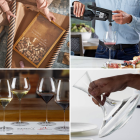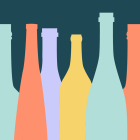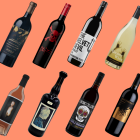From ultra-fast cooling to vineyard optimisation, these smart innovations are changing the world of wine for the better.
From the first monks observing grapevine cycles and adjusting their practices accordingly, to smart developments in fining and storage, science and innovation has always been the bedrock of winemaking. Here are 10 contemporary inventions that are pushing the business of winemaking – and appreciation – ever forward.
- Tackling vineyard threats
Problems in the vineyard have always been a concern for winemakers – the devastating blight of phylloxera in the 19th century is one such example. Now, with climate change an increasing risk, winemakers have a myriad of other issue to consider too, and technology is stepping in to help mitigate these threats. A winery in Oregon, for example, has built a ‘UV robot’ to battle the blight of potentially destructive powdery mildew, while winemakers in Burgundy are tackling extreme storms with high-tech systems that deploy particles of silver iodine into the atmosphere to form a shield against hail.
- Understanding aging
Aging is a central tenet in the creation of fine wine, and there are numerous research studies taking place around the world – and out of it! – to help winemakers better understand the process. Recently, a dozen cylinders of Bordeaux’s Petrus and 320 vine canes returned from space, where it was found that a jaunt into orbit had ‘energised’ the vines, helping them to grow faster. The wine, meanwhile, was said to taste more developed. Back on Earth, a number of wineries are experimenting with underwater aging, with some winemakers suggesting that seven months of underwater aging can reflect “up to seven years” of cellar aging.
- Immersive packaging
Augmented reality is gaining traction in all corners of the packaging landscape and wine is no exception. A label is no longer simply a label – some innovators are keen for the exterior of a bottle to act as a gateway to an entire experience. Sparflex, for example, has developed a wine foil that – when scanned by its corresponding app – comes to life with animations and text, telling the story of the wine in question and acting as a sales portal to the producer’s website.
- Ultra-fast cooling
Serving wine at its optimal temperature is an important part of achieving a prime tasting experience, but we don’t all have the time (or inclination) to wait for a bottle to chill in the fridge. Enter Juno, a device that uses ‘reverse microwave technology’ to chill white and red wine to sommelier-recommended temperatures in just three minutes. It can also be used to chill beer, coffee and soft drinks.
- A new take on wine collecting
We live in an increasingly-digital world, so it was only a matter of time before the old-school art of collecting entered the realm of pixels and binary code. NFTs (non-fungible tokens) are grabbing a lot of headlines at the moment, and they’ve arrived in the wine business, too. An NFT is a unit of data that is stored on a blockchain, representing a ‘digital asset’ that is unique and is therefore not interchangeable. We’ve seen a lot of NFTs in recent times, from Twitter founder Jack Dorsey’s first-ever tweet (which sold for $2.9 million) to artist Kevin Abosch’s virtual artwork ‘Forever Rose’ (which sold for $1 million). Now wineries are doing the same. French winemaker Chateau Darius, for example, has recently begin selling ‘digital bottles’ of its Bordeaux for more than £300 apiece.
- The perfect blend
Compared to humans, artificial intelligence is able to process colossal volumes of data at relatively lightning speeds, and a wide range of industries are adopting the technology for all kinds of applications. Winemaking is no exception, with one such example, Tastry, expected to launch in Europe later this year. The system analyses tens of thousands of wines every year, initially to help winemakers target their wines more efficiently, and more recently to help guide them in identifying the optimal tanks to use during the blending process.
- Minimising manual labour
Vineyard workers are often tied up with repetitive and physically demanding tasks in the vineyard when their skills could be put to better use elsewhere. Not so the case at Chateau Clerc Milon, though, where a robot named ‘Ted’ has been bought in to help with soil cultivation and vine weeding. According to the chateau, “As well as helping to make our vineyard work less arduous and respecting the soil, it will reduce our dependency on fossil energies and the harm caused by traditional agricultural machinery.”
- Personal service
The next best thing to having your very own personal sommelier on staff is having your very own personal virtual sommelier on staff. This is the latest offering from WineCab, which has designed a visually-arresting wine wall (pictured) with an AI-powered virtual sommelier that can make suggestions and personalised recommendations based on your specific preferences. It even features a robotic arm that will select and present each bottle to you.
- Counterfeiting prevention
Fine wine counterfeiting is a big problem for the wine industry, with unsuspecting buyers at risk of losing thousands and nefarious actors scamming millions. The advent of blockchain technology and other digital innovations is making this harder, though. Prooftag, for example, has developed a comprehensive labelling system that relies on digital ledgers to guarantee complete tamper-proof authenticity.
- Reducing cork taint
Cork taint is an age-old nuisance for winemakers and drinkers alike, and while trends are increasingly moving towards screw-cap bottles, those that maintain the traditional ways of doing things are still trying to mitigate this risk. There’s been lots of research in this area, from NASA-based tech to pure and simple analytical chemistry. One company, however, says it’s tantalisingly close to doing away with the fault forever. According to Portugal-based natural cork specialist Amorim, it will soon be able to guarantee the corks it produces will have a cork taint risk “equal to zero”.






